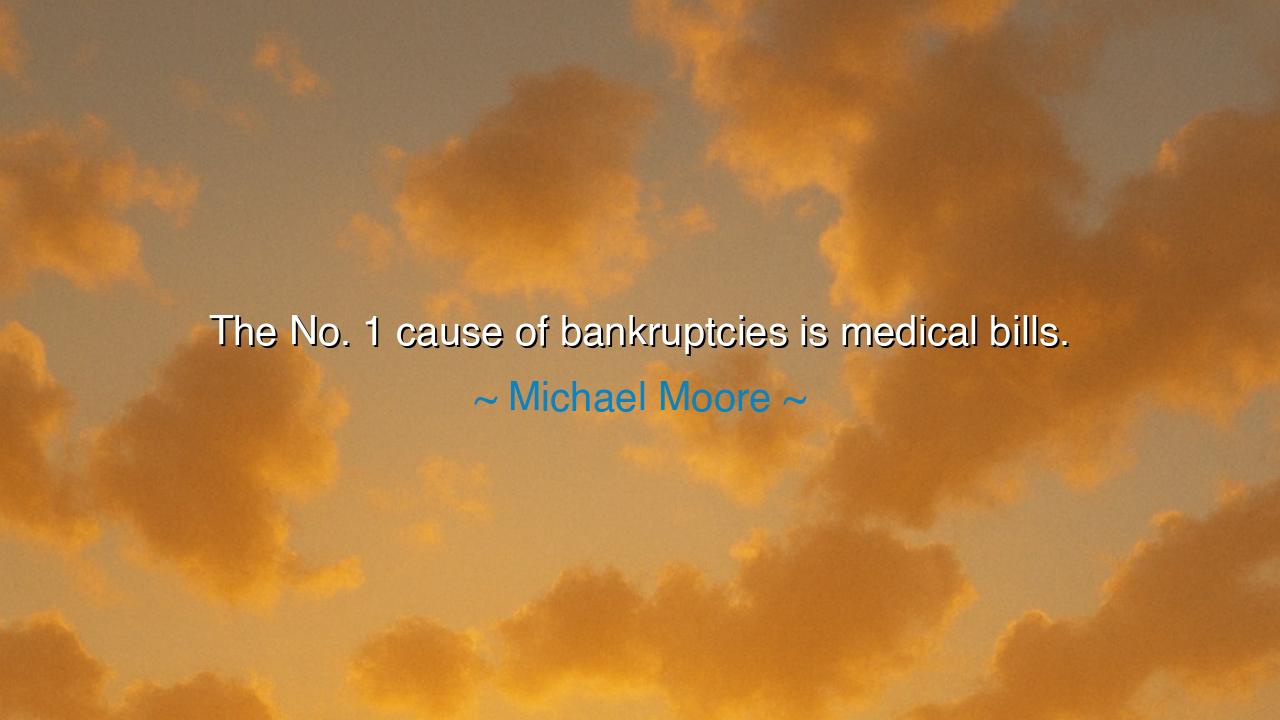
The No. 1 cause of bankruptcies is medical bills.






"The No. 1 cause of bankruptcies is medical bills." These words from Michael Moore strike at the heart of a grim reality in the modern world, where illness and healthcare are no longer simply about the care we receive, but about the cost—a burden so heavy that it can break families and destroy lives. Moore’s statement is an indictment of a system that, instead of healing, often worsens the suffering of its patients, particularly when the pursuit of health comes at the expense of financial security. This powerful observation calls us to reflect on the relationship between health and wealth, and the toll that a lack of universal healthcare can take on the most vulnerable.
In the ancient world, health and medicine were seen as essential to the well-being of both the individual and the community. Hippocrates, the father of modern medicine, understood that a healthy body was not only vital for the individual but for society at large. He sought to provide care based on knowledge and compassion, rather than financial gain. However, even in ancient times, there were challenges with access to care, and the wealthy had an advantage in receiving the best treatment, while the poor suffered. But never before had the gap between health and wealth become as stark as it is today, where medical bills have the power to ruin lives in a system that prioritizes profit over care.
The rise of capitalism during the industrial era further deepened the divide between the wealthy and the poor in terms of healthcare. The story of the Industrial Revolution is filled with stories of workers toiling in factories for long hours, suffering from injuries and illnesses, only to be left with nothing when they became sick. There was no health insurance to fall back on—just the cruel reality that if you couldn’t work, you couldn’t survive. Even during the time of Charles Dickens, the poor were left at the mercy of a system that cared little for their well-being. The idea that medical bills could be the leading cause of bankruptcy in the modern world might seem like a failure of the past, but in reality, it is an extension of these age-old injustices.
As Moore points out, the number of bankruptcies caused by medical debt is a symptom of a larger societal illness—a system that does not treat healthcare as a right but as a commodity. This is not a new phenomenon. In the United States, the struggle to afford healthcare has led to widespread suffering. Stories of people who are forced to choose between paying for life-saving treatments or their basic needs are not rare. This echoes the ancient greed of those in power who, in their pursuit of wealth, ignore the basic needs of the people. For Moore, this is an unforgivable injustice—a system where health becomes an unattainable luxury for those without the means to pay.
Take, for example, the story of Dr. Paul Farmer, a physician and anthropologist, who devoted his life to bringing healthcare to the poor in places like Haiti. Farmer’s work demonstrated that healthcare is not a luxury but a human right. He provided life-saving care to those in need, regardless of their ability to pay. His approach was a radical departure from the current system in which the poorest are forced to endure the harshest conditions, not just because of their lack of resources but because of an economic system that sees medicine as a commodity rather than a right. Farmer’s work stands as a testament to the belief that medical care should not drive people into debt but should be accessible to everyone, regardless of their socioeconomic status.
The lesson in Moore’s quote is not just about the failure of healthcare systems but about the broader societal values that have led to this crisis. We must ask ourselves: what is the price of human life in a system that forces people into bankruptcy for seeking care? Health should be seen as a fundamental right that ensures dignity and well-being for all people, not a privilege for the wealthy few. If a system truly values human life, it must be one where no one is forced to choose between life-saving treatment and their financial stability.
In our own lives, we can take action by advocating for a system where healthcare is accessible to all, where medical debt is not a sentence of ruin, and where the value of a human life is not determined by their bank account. Just as Dr. Paul Farmer showed us that compassionate healthcare is possible, so too must we push for a world where equality in health is a priority. Let us work toward a society where people are not burdened by the cost of getting well, but instead, can live in the knowledge that their health is protected and their dignity maintained. Medical bills should not be the death knell for anyone's dreams. Let us change the narrative and create a world where healthcare is not a financial burden but a basic right afforded to all.






AAdministratorAdministrator
Welcome, honored guests. Please leave a comment, we will respond soon